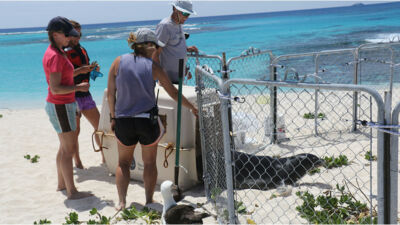Career Spotlight: Protecting oceans and preserving futures as a marine conservationist

Are you interested in marine life and the health of the world’s oceans? Have you ever wanted to advocate for marine preservation? Or maybe you have wanted to monitor the health of species like sea turtles or dolphins? If so, then you should investigate marine conservation, and how you can find the right position in this field to fit your interests.
Marine conservation is a very important field that works to preserve the health of marine ecosystems by managing human activities that impact them. There are many career opportunities within this field, ranging from marketing to photography to on-site research. Concordia University, Nebraska can prepare you for a career in marine conservation research starting with an undergraduate degree in biology or environmental science.
Marine conservationists are responsible for many different things. Depending upon their role in the team that they work on, some of their responsibilities might include monitoring marine life, advocating for ocean conservation, working in marine protection programs, or working in public education and outreach.
For students looking more into the field work side of marine conservation, their work would be more hands-on than some of the other marine conservation branches. They would conduct studies to assess the health of marine ecosystems, monitor different species populations, and investigate the impacts of human activities on marine environments. Some of their tasks could include assisting with restoration efforts, collecting water samples for analysis or conducting underwater surveys of coral reefs.
While there are careers in marine conservation that do not require a college degree, there are many that do. For students interested in marine conservation that are pursuing a bachelor’s degree, studies in biology, ecology, environmental biology or conservation biology are recommended. There are also many shorter courses and certification programs that teach skills such as diving that can be helpful in jumpstarting your career.
While the path to become a marine conservationist can have many twists and turns, the rewards are great. The average marine conservationist working in the United States made around $127,000 as of February 2025. The BLS predicted that employment for zoologists and wildlife biologists, including marine conservationists, is projected to grow 4% in the next 8 years.
Looking at all the opportunities, a career as a marine conservationist is a fantastic career option for students interested in marine life and life sciences like biology. Conducting research studies, analyzing samples and monitoring marine species are all exciting roles of these professionals. Consider your interests and where God is calling you, and you might find yourself on the path to marine conservation.
The science programs at Concordia University, Nebraska can provide you with strong foundations in research, discovery and critical thinking to equip you for your future career in science, as well as your many vocations serving your community, the church and the world. Concordia is committed to providing experiences that promote scientific inquiry and intellectual, spiritual and emotional growth. Learn more about Concordia’s science programs here.
Interested in environmental science programs at Concordia University, Nebraska?
Related Stories


